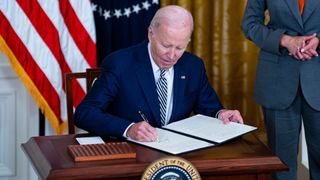US President Joe Biden signs executive order 'to protect Americans from the potential risks of AI systems'
The executive order comes the same day as an agreement among G7 nations to establish guidelines for AI development.

In a legislative attempt to stave off the inevitable demise of humanity at the hands of roaming hunter-killer robots, US President Joe Biden has issued an executive order establishing a new set of standards that will guide the development of AI. The order includes requirements to "develop standards, tools, and tests to help ensure that AI systems are safe, secure, and trustworthy," and to share relevant data about AI models with the US government.
Worries about potential negative outcomes of artificial intelligence development have grown in lockstep with the rapid rise of AI development itself. Skynet scenarios are fun to contemplate but the more immediate problem is the use of AI in the generation of exceedingly realistic audio and video clips that can be put to nefarious use, as Biden himself noted in a recent address.
President Biden ahead of signing an executive order imposing safety and security measures on AI:“With AI, fraudsters can take a three-second ... recording of your voice. I’ve watched one of me … I said, ‘When the hell did I say that?’” pic.twitter.com/GKACIVPjHaOctober 30, 2023
"With AI, fraudsters can take a three-second recording of your voice—I've watched one of me, I said, 'When the hell did I say that?'," Biden said. "All kidding aside, a three-second recording of your voice, and generate an impersonation good enough to fool—I was going to say fool your family, [but] fool you."
The new executive order promises "the most sweeping actions ever taken to protect Americans from the potential risks of AI systems," and they definitely cover a lot of ground. Highlights include:
- Requiring that companies developing AI systems "that poses a serious risk to national security, national economic security, or national public health and safety" share safety test results and other "critical" data with the US government in accordance with the Defense Production Act.
- Developing a set of standards, tools, and tests that will be defined and applied by multiple agencies including the National Institute of Standards and Technology, the Department of Homeland Security, and the Department of Energy to ensure AI systems "are safe, secure, and trustworthy."
- Developing new standards for biological synthesis screening to protect against the risk of AI being used to create new and dangerous biological materials, which honestly isn't something I'd considered until now, so thanks for that.
- Establishing "standards and best practices for detecting AI-generated content and authenticating official content" in order to protect against fraud and the spread of disinformation.
The order also calls for action to address "algorithmic discrimination," which is good, although the bit about "developing best practices on the use of AI in sentencing, parole and probation, pretrial release and detention, risk assessments, surveillance, crime forecasting and predictive policing, and forensic analysis" is perhaps a little too Minority Report for my liking. And of course there's a plan to advance and accelerate AI research in the US through the establishment of the National AI Research Resource, which will make relevant information more readily available to researchers and students, and expanded grants for research in various AI-related fields.
Biden also called for bipartisan Congressional action to ensure privacy protections in the training and use of AI systems. "This executive order represents bold action, but we still need Congress to act," Biden said in a speech (via CNBC).
The executive order comes the same day as the announcement of an agreement by G7 nations on guiding principles of AI development and a voluntary code of conduct for developers under what is known as the Hiroshima Process, which was established in May "to promote guardrails for advanced AI systems on a global level. The initiative is part of a wider range of international discussions."
The biggest gaming news, reviews and hardware deals
Keep up to date with the most important stories and the best deals, as picked by the PC Gamer team.
"We believe that our joint efforts through the Hiroshima AI Process will foster an open and enabling environment where safe, secure, and trustworthy AI systems are designed, developed, deployed, and used to maximize the benefits of technology while mitigating its risks, for the common good worldwide, including in developing and emerging economies with a few to closing digital divides and achieving digital inclusion," the G7 leaders said in a joint statement.
The G7 nations also called on developers of AI systems to commit to an international code of conduct, and said that the first signatories to those guidelines will be announced "in the near future."
Andy has been gaming on PCs from the very beginning, starting as a youngster with text adventures and primitive action games on a cassette-based TRS80. From there he graduated to the glory days of Sierra Online adventures and Microprose sims, ran a local BBS, learned how to build PCs, and developed a longstanding love of RPGs, immersive sims, and shooters. He began writing videogame news in 2007 for The Escapist and somehow managed to avoid getting fired until 2014, when he joined the storied ranks of PC Gamer. He covers all aspects of the industry, from new game announcements and patch notes to legal disputes, Twitch beefs, esports, and Henry Cavill. Lots of Henry Cavill.

After closing its AAA games development studio, Netflix Games VP transforms into the VP of GenAI for Games and the gobbledygook must flow: 'a creator-first vision… with AI being a catalyst and an accelerant'

OpenAI has bought the URL of what used to be an adult video chat website for more than $15,500,000
Most Popular






